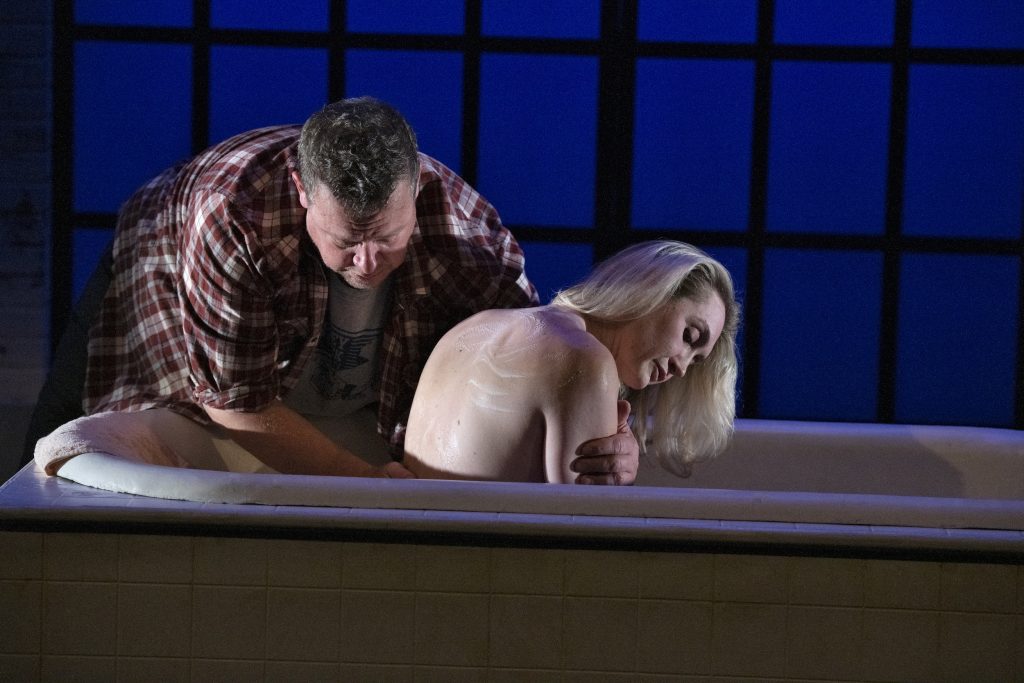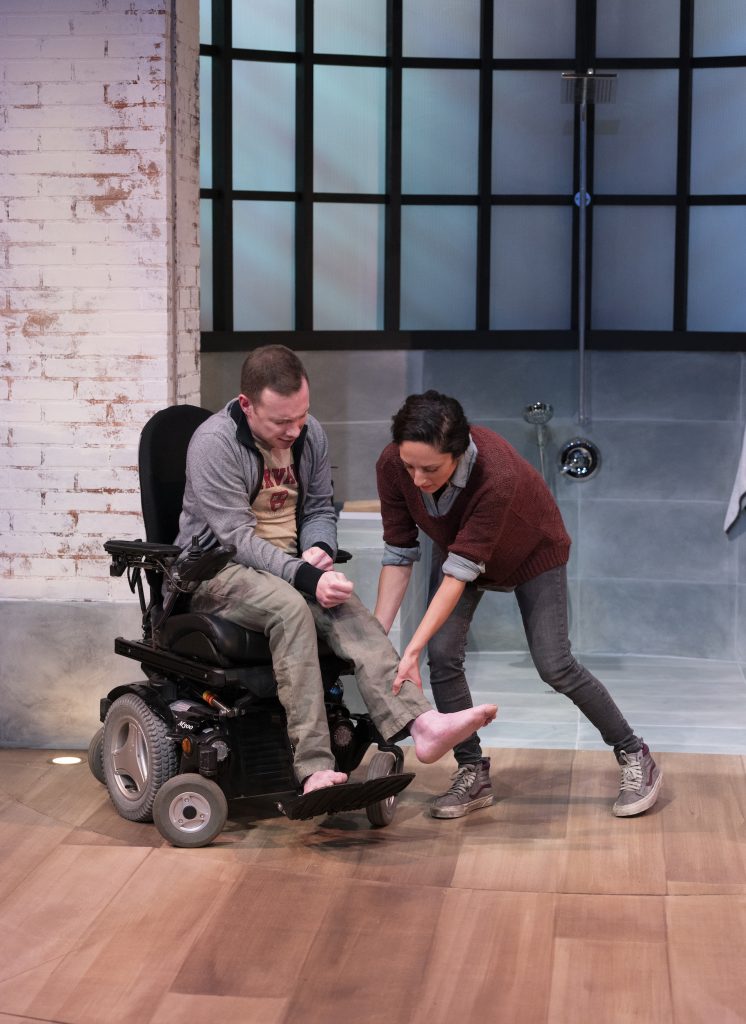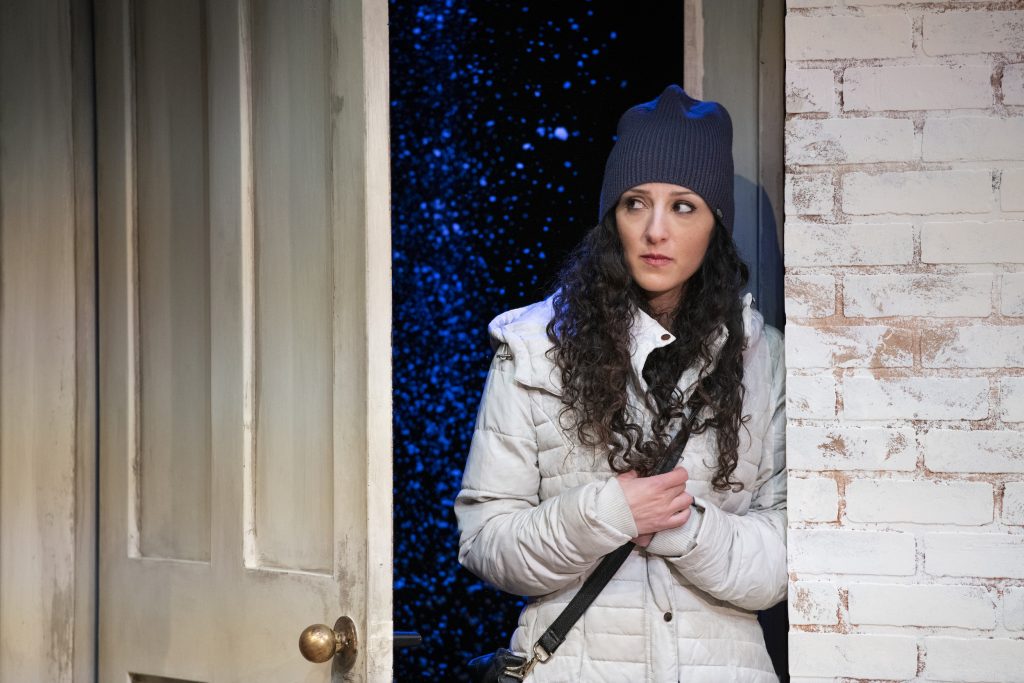
Credit: David Cooper
Goldcorp Stage at the BMO Theatre Centre until November 3, 2019
Tickets from $29 at artsclub.com or 604-687-1644
Posted October 19, 2019
Sometimes you wonder what the criteria is for winning the Pulitzer Prize for Drama. Cost of Living, written by American-Polish playwright Martyna Majok, won the prize in 2018 and it’s a relevant, heart-warming play about caring and caregivers, but we are too often left to speculate about the characters’ backstories and motivation. Clearly, the Pulitzer committee thought the play’s strengths outweighed its weaknesses. And there are strengths.
The Arts Club, under the direction of Ashlie Corcoran, is co-producing this Canadian premiere with Edmonton’s Citadel Theatre.
Like quite a few plays these days, we are asked to consider who, really, is disabled: the apparently ‘whole’ or the physically, emotionally or psychologically wounded?

Set design: Drew Facey
Credit: David Cooper
Cost of Living begins with a long, chatty monologue as Eddie (Ashley Wright) waits in a bar for a woman, a stranger. “The shit that happens is not to be understood,” he tells us, and Eddie has had to deal with a lot of that lately. His wife Ani (Teal Sherer), from whom he was separated, has recently died from complications arising from a car accident that left her paraplegic. Wright makes long-haul truck driver Eddie likeable as he delivers some cozy home truths and thoughts on the long distance trucker, away from home, driving through the night, missing his wife but loving the freedom.
Switch abruptly to an apartment with a very handsome grey marble spa behind an opaque screen. Jess (Bahareh Yaraghi) has arrived for a job interview at the home of John (Christopher Imbrosciano), a young, rich, PhD student at Princeton. John has cerebral palsy and is hiring a caregiver. When Jess, trying hard to be tactful, uses the phrase “differently-abled” he jumps down her throat with, “Differently-abled. It’s fucking retarded” to call him that, he says. In fact, their entire interaction at this point is prickly. Why?

Credit: David Cooper
They spar. She has a PhD from Princeton but is working at two late-night bars and looking for more work. She’s a wreck. What’s her story? He’s nasty and rich. He’s a student; why is he rich? Surprisigly, Jess gets the job and a bond develops over time.
Back to Eddie and into to the past: Ani is in a wheelchair in her own apartment – they have split up – and he is trying to convince her to let him help out. Foul mouthed, she rejects his offer. Was their marriage so bad and why is she so bitter towards him? He was not involved in the accident that left her with spinal cord injury so it’s not that. “I’m sad and pissed for however long I’m pissed and sad.” And he’s lonely. These are two people who love or have loved each other but for some reason are no longer together.

Credit: David Cooper
Late in the play there is a misunderstanding between Jess and John that makes no sense. He’s not completely insensitive. How could he – or she – have misread their relationship so badly?
We go back and forth in time before these two stories – Ani and Eddie, and Jess and John – come together.
Under Corcoran’s direction these are four excellent performances. Wright gives us a kind of amiable, cuddly Eddie; Imbrosciano presents a credible John, even if we don’t like the character much; Sherer is a bristly Ani, ticked off with the life she’s been left with; and Yaraghi’s Jess is a bundle of nerves – especially at the end when Jess appears so traumatized she cannot even come in out of the falling snow.
Two parallel scenes are standouts: Jess bathing John in his shower and Eddie washing Ani in her bathtub. There’s physical intimacy in both scenes (naked bodies, washcloths, water) without emotional or sexual connection.
Drew Facey’s set features a useful revolve allowing for various locations: the bar, Ani’s place, John’s apartment and finally the living room of the home Eddie shared with Ani in happier times.
This production ends so abruptly that the night I attended the audience did not know it was over until the cast took its curtain call. We should know when a play is over. Interestingly, the curtain call had surprises of its own to reveal.
Cost of Living is a worthwhile play, nicely realized on the Goldcorp stage, but unless we understand why characters behave as they do, it’s difficult to buy into them – and we want to.

